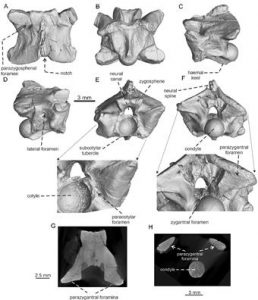 PIB Delhi – Scientists have reported spotting of the fossil of a Madtsoiidae snake from the molasse deposits of Ladakh Himalaya for the first time indicating their prevalence in the subcontinent for much longer time than previously thought. Madtsoiidae is an extinct group of medium-sized to gigantic snakes, firstly appeared during the late Cretaceous and mostly distributed in the Gondwanan landmasses, although, their Cenozoic record is extremely scarce. From the fossil record, the whole group disappeared in the mid-Paleogene across most Gondwanan continents except for Australia where it survived with its last known taxon Wonambi till late Pleistocene.
PIB Delhi – Scientists have reported spotting of the fossil of a Madtsoiidae snake from the molasse deposits of Ladakh Himalaya for the first time indicating their prevalence in the subcontinent for much longer time than previously thought. Madtsoiidae is an extinct group of medium-sized to gigantic snakes, firstly appeared during the late Cretaceous and mostly distributed in the Gondwanan landmasses, although, their Cenozoic record is extremely scarce. From the fossil record, the whole group disappeared in the mid-Paleogene across most Gondwanan continents except for Australia where it survived with its last known taxon Wonambi till late Pleistocene.
Dr. Ningthoujam Premjit Singh (corresponding author), Dr. Ramesh Kumar Sehgal, and Mr. Abhishek Pratap Singh from Wadia Institute of Himalayan Geology, Dehradun, India in association with Dr. Rajeev Patnaik and Mr. Wasim Abass Wazir from Punjab University Chandigarh; Dr. Navin Kumar and Mr. Piyush Uniyal from Indian Institute of Technology Ropar, and Dr. Andrej Čerňanský of Comenius University Slovakia have reported for the first time a Madtsoiidae snake from the late Oligocene ( part of the Tertiary Period in the Cenozoic Era, and lasted from about 33.7 to 23.8 million years ago) of India or the molasse deposits of Ladakh Himalaya. The occurrence of Madtsoiidae from the Oligocene of Ladakh indicates their continuity at least to the end of the Paleogene (geologic period and system that spans 43 million years from the end of the Cretaceous Period 66 million years ago). The research published in Journal of Vertebrate Paleontology shows that the members of this group were successful in this subcontinent for much longer time than previously thought. The global climatic shifts and the prominent biotic reorganization across the Eocene-Oligocene boundary (which correlates to the European Grande Coupure), did not cause the extinction of this important group of snakes in India.


